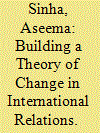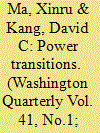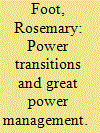| Srl | Item |
| 1 |
ID:
160050


|
|
|
|
|
| Summary/Abstract |
Fundamental transformations in the distribution of power among nations have re-focused the attention of the International Relations (IR) subfield on how to understand change and power transitions. I add to this larger literature by presenting a typology of change drawn from comparative politics that incorporates attention to incremental or slow moving change, and path-dependence as a theoretical tool to explain discontinuous change such as wars, and the fall of the former Soviet Union. I offer a distinction between process of change and its outcome. Change may be incremental or disruptive and could lead to continuity with existing institutions or their transformation. This typology allows us to explore the process of change and develop theories of change in a new way. In essence, I argue for broadening our conceptions of change to account for endogenous sources of change (internal to the system), and incremental yet significant change.
|
|
|
|
|
|
|
|
|
|
|
|
|
|
|
|
| 2 |
ID:
159269


|
|
|
| 3 |
ID:
155089


|
|
|
|
|
| Summary/Abstract |
What kind of challenge did a rising Japan in the 1970s and 1980s pose to the United States, and how does that differ from the challenge that China has posed to US primacy in East Asia since the early 2000s? This article compares and contrasts US responses to these two shifts in relative power, in the process aiming to elucidate how changes that portend a power transition are understood and dealt with and how great powers manage the security order at times of disruption. In these respects, the article contributes to the empirical understanding of why some power transitions do not result in conflict given the tools available to great powers to manage relations at times of stress.
|
|
|
|
|
|
|
|
|
|
|
|
|
|
|
|
| 4 |
ID:
158413


|
|
|
|
|
| Summary/Abstract |
Although power transition theory offers a powerful model of international conflict, scholars have not adequately operationalized the theory's key variable of satisfaction/dissatisfaction with the status quo. We argue that status dissatisfaction is an important component of a rising state's overall dissatisfaction with the system. We apply our revised power transition framework to the 1894–1895 Sino-Japanese War. Japan's revisionist foreign policy was driven by economic and security threats posed by China's control over Korea, dissatisfaction with Japan's place in the China-dominated East Asian hierarchy, the hope for recognition as a great power by the West, status-related domestic pressures, and by belief change that was endogenous to shifting power. Despite several earlier crises, Japan made the decision for war only after it had achieved parity with China, which is consistent with power transition theory's hypothesis that under conditions of shifting power, parity is a necessary condition for war.
|
|
|
|
|
|
|
|
|
|
|
|
|
|
|
|